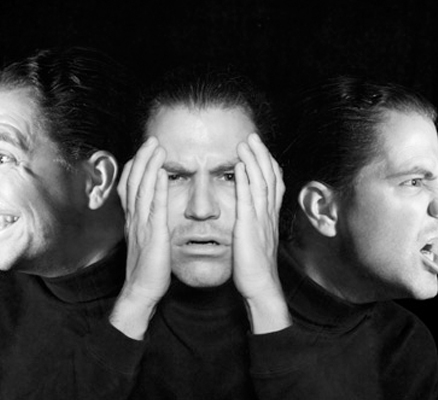Treatment:
1. Learn as much as you can about bipolar disorder:-. The more you know, the better you'll be at assisting your own recovery.
2. Keep stress in check:- Avoid high-stress situations, maintain a healthy work-life balance, and try relaxation techniques such as meditation, yoga, or deep breathing.
3. Seek support:-Try joining a support group or talking to a trusted friend. Reaching out is not a sign of weakness and it won't mean you're a burden to others. In fact, most friends will be flattered that you trust them enough to confide in them, and it will only strengthen your relationship.
4. Make healthy choices:- Healthy sleeping, eating, and exercising habits can help stabilize your moods. Keeping a regular sleep schedule is particularly important.
5. Monitor your moods:- Keep track of your symptoms and watch for signs that your moods are swinging out of control so you can stop the problem before it starts.
B. Major Depressive Disorder:
The disorder must represents a change from the person's normal mood; social, occupational, educational or other important functioning must also be negatively impaired by the change in mood. A depressed mood should not be caused by substances such as drugs, alcohol and medications.
Symptoms:
1. Depressed mood most of the day, nearly every day, as indicated by either subjective report (e.g., feels sad or empty) or observation made by others (e.g., appears tearful). (In children and adolescents, this may be characterized as an irritable mood.)
2. Markedly diminished interest or pleasure in all, or almost all, activities most of the day, nearly every day
3. Significant weight loss when not dieting or weight gain (e.g., a change of more than 5% of body weight in a month), or decrease or increase in appetite nearly every day
4. Psychomotor retardation nearly every day
5. Feelings of worthlessness or excessive or inappropriate guilt nearly every day
6. Diminished ability to think or concentrate, or indecisiveness, nearly every day
7. Recurrent thoughts of death (not just fear of dying), recurrent suicidal ideation without a specific plan, or a suicide attempt or a specific plan for committing suicide.
Tips for Dealing with Depression
1. BREAK TASKS DOWN INTO SMALL STEPS :-
A common symptom of depression is the feeling of being overwhelmed even by ordinary day-to-day tasks. Even getting out of bed and getting dressed can feel like a huge hurdle and people become more withdrawn and less active as depression becomes more severe.
The best way to overcome feeling overwhelmed is to break down the activity in small, easier-to-achieve chunks.
2. AVOID ISOLATION BY CONNECTING WITH PEOPLE:-
When the first signs of depression appear it is important to spend more time cultivating relationships with family, loved ones and friends, for they are the very people who will be there for the individual as their support network. Being able to talk about your problems makes dealing with them easier and therefore it is very helpful to identify the people you can trust and rely on.
3. GO FOR A WALK:-
The correlation between exercise and feeling good has long been established. And feel-good hormones such as dopamine and endorphins which are produced during exercise can improve mood in individuals with mild to moderate depression. It can be difficult to stay motivated when depressed so vigorous exercise such as running or going to the gym can be tough to keep up. However even moderate exercise like a brisk walk has been shown to improve mood.
4. LEARN SOME RELAXATION TECHNIQUES:-
Deep breathing and relaxing the muscles are the basis of all relaxation techniques and these two physiological actions work very effectively to help the psychological aspects of depression.
5. IMPROVE YOUR DIET :-
Eating four to six small meals throughout the day rather than two to three large ones can help stabilise blood sugar levels, giving you more energy to deal with the day and avoiding sugar crashes and cravings that will sap what energy you do have.
6. LIMIT ALCOHOL AND CAFFEINE :-
Alcohol and caffeine in the form of coffee are used by many who are depressed to purportedly help them through the day. This form of self medication may seem like a useful coping strategy to some, however it is far from helpful as both alcohol and caffeine are psychoactive drugs which cross the blood-brain barrier and affect brain functioning resulting in changes in mood, thinking, behaviour, perception and consciousness.
While the short-term effects of these psychoactive drugs may appear beneficial but in the long term brain chemistry is being altered and mood ultimately becomes more unstable which can make the symptoms of depression worse.
7. HAVE A REGULAR SLEEP TIME:-
Getting a good night's sleep is important for everyone especially for those suffering from depression. Conversely too much sleep (over eight hours) can exacerbate depression.



